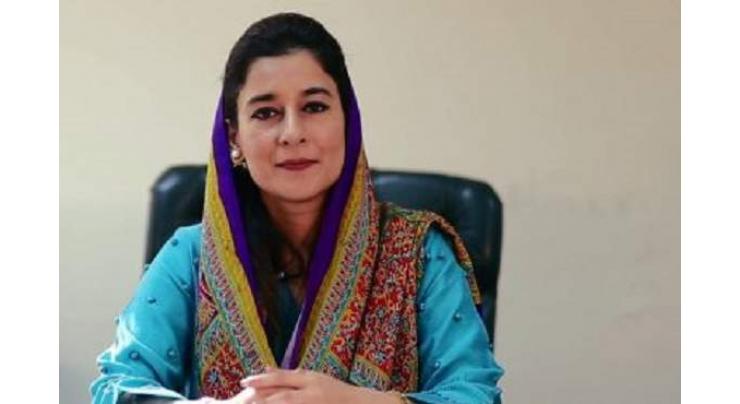- Advertisement -
ISLAMABAD, Feb 17 (APP):The National Commission on the Rights of Child (NCRC) organized a National Consultation on the Use of Harmful Substances/Drugs in Educational Institutes, bringing together key stakeholders, including policymakers, educators, law enforcement officials, and civil society representatives, to discuss strategies for combating the growing issue of drug abuse among students.
In her opening remarks, Chairperson NCRC, Ayesha Raza Farooq, stressed the importance of a multi-stakeholder approach, stating, “Parents and caregivers are the first line of defence against drug abuse. Their role in prevention is crucial. Parents must create safe spaces that promote open communication, where children feel comfortable discussing sensitive issues without fear of judgment. This open communication builds trust, empowering children to make informed choices.”
She further emphasized the critical role of educational institutions, noting, “Teachers and educational institutions play a key role in shaping young minds. They are uniquely positioned to identify early signs of behavioral changes that may indicate drug use.”
Ayesha Farooq stated, “To effectively tackle the drug abuse issue, law enforcement agencies must take decisive action to dismantle drug mafias and control the supply chain, especially around educational institutions.
Khalid Naeem, Member ICT, NCRC, elaborated on the objectives of the consultation, emphasizing the need for a collaborative approach to raise awareness, build capacity among educators, and strengthen preventive measures in educational institutes.
Cristina Von Sperling Afridi, Chairperson, Karim Khan Afridi Welfare Foundation, said, “Drug abuse has become a national security threat in the country. Education is the most powerful tool for prevention.
She said schools should encourage positive activities, such as ensuring a minimum of four hours of sports per week. Additionally, schools should adopt a comprehensive drug policy, implement routine health monitoring, and provide counseling services for students.”
During the panel discussion, Senator Khalil Tahir highlighted the need for balanced legislation, noting, “While strict punishments must be enforced for drug traffickers, our laws must strike the right balance.
He said raising awareness is crucial, and the Ministry of Narcotics must lead nationwide awareness campaigns through TV, radio, and social media.”
MNA Sehar Kamran emphasized a three-phase approach of prevention, rehabilitation, and aftercare, stating, “Overcrowded prisons make punitive measures less effective. We need proactive and rehabilitative strategies that prioritize recovery and reintegration into society.”
Hakim Khan, SP, ICT Police said, “Currently, records are maintained for students caught with small amounts of drugs or cigarettes, which may create lifelong barriers to employment and obtaining visas. To prevent unnecessary stigmatization and reduce the likelihood of recurring substance use, a system should be established to expunge records of first-time users, allowing them a chance at rehabilitation and reintegration into society without any stigma.”
Ijaz Khan, Deputy Secretary, Ministry of Narcotics/Interior, emphasized the importance of strengthening law enforcement’s capacity to effectively prevent drug abuse.
He stated, “Equipped with the right knowledge and resources, law enforcement personnel can play a pivotal role in prevention, detection and intervention, safeguarding our youth from the harmful impacts of substance abuse.”
In the closing address, Chief Guest, Secretary Ministry of Federal Education and Professional Training Mohyuddin Ahmad Wani shared his insights on the issue of substance abuse.
He emphasized that tackling the problem must be through a combination of training of teachers and caregivers and the incorporation of age-appropriate content in the curricula for students.
During the consultation key stakeholders worked in groups to discuss and propose key recommendations aimed at tackling the growing issue of substance abuse in educational institutes. It was proposed that the federal government allocate a dedicated budget to Ministry of Federal Education & Professional Training and Ministry of Narcotics/Interior to outline actionable points for preventing drug abuse. Furthermore, the importance of allocating prime-time slots for public awareness campaigns focused on substance abuse prevention, ensuring the already mandated 10% air time is implemented effectively.
The stakeholders also called for stricter content monitoring regulations for social and electronic media to reduce exposure to harmful substances. In addition, there was a strong emphasis on providing accessible, affordable and quality-controlled drug rehabilitation services for those in need.
To ensure inclusivity and confidentiality, the consultation recommended the creation of mechanisms that address the specific needs of children engaged with harmful substances. The importance of promoting positive alternatives, such as arts, sports, and extracurricular activities, was also stressed, with the recommendation that these be made mandatory across both public and private institutions.
Lastly, a proposal was made to establish a committee within all educational institutions that includes all relevant stakeholders to oversee case management, prevention, coordination and referrals. The committee would also ensure that mandated free counseling services are made available to all students, with their confidentiality fully respected.
The consultation concluded with a call for enhanced collaboration among parents, educators, law enforcement, and policymakers to create a supportive environment that prevents drug abuse while promoting rehabilitation and reintegration.

